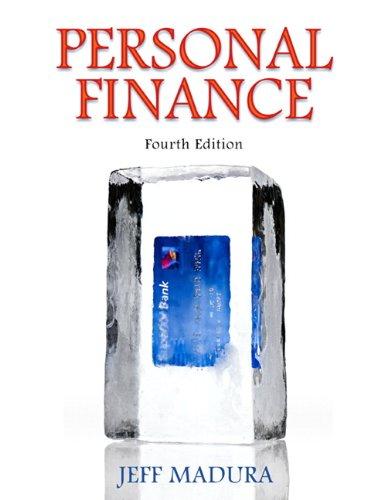Answered step by step
Verified Expert Solution
Question
1 Approved Answer
Please explain solution I dont understand how they got the numbers and equations explain all thank you, this is measuring the rate of return of


Please explain solution I dont understand how they got the numbers and equations explain all thank you, this is measuring the rate of return of an investment.
EXAMPLE 5.1 (Internal rate of return) Smith buys 1000 shares of stock at 5.00 per share and pays a commission of 2%. Six months later he receives a cash dividend of .20 per share, which he immediately reinvests commission-free in shares at a price of 4.00 per share. Six months after that he buys another 500 shares at a price of 4.50 per share, along with a commission of 2%. Six months after that he receives another cash dividend of .25 per share and sells his existing shares at 5.00 per share, again paying a 2% commission. Find Smith's internal rate of return for the entire transaction in the form i(2). SOLUTION Let time 0 represent the time of the original share purchase. Then A = 0 and Bo = 5100, the initial outlay including commission. Measuring time in 6- month intervals, we have t=1 at 6 months with 4 = 200 and B, = 200, since he receives and immediately reinvests the dividend of 200, buying an additional 50 shares. Then t= 2 is at 12 months with A, = 0 and B, = 2295 (buying an additional 500 shares for a total of 1550 shares), and t = 3 is at 18 months with Az = 387.50+ 7595 = 7982.50 (the dividend on 1550 shares plus the proceeds from the sale of the shares after commission) and B2 = 0. The net amounts received are Co = -5100, C = 0, C2 = -2295, and C3 = 7982.5, so we wish to solve the equation, -5100 2295.v2 + 7982.5.13 = 0, or, equivalently, f(j) = 5100(1+j)? +2295(1+j) 7982.5 = 0, where the v and j factors are based on 6-month interest rates so that i(2) = 2 j. Using a financial calculator with multiple cashflow capability such as the TI BA II PLUS or the HP-12C, the unknown interest rate is found to be j = 3.246%, or equivalently, (2) = 6.49%. EXAMPLE 5.1 (Internal rate of return) Smith buys 1000 shares of stock at 5.00 per share and pays a commission of 2%. Six months later he receives a cash dividend of .20 per share, which he immediately reinvests commission-free in shares at a price of 4.00 per share. Six months after that he buys another 500 shares at a price of 4.50 per share, along with a commission of 2%. Six months after that he receives another cash dividend of .25 per share and sells his existing shares at 5.00 per share, again paying a 2% commission. Find Smith's internal rate of return for the entire transaction in the form i(2). SOLUTION Let time 0 represent the time of the original share purchase. Then A = 0 and Bo = 5100, the initial outlay including commission. Measuring time in 6- month intervals, we have t=1 at 6 months with 4 = 200 and B, = 200, since he receives and immediately reinvests the dividend of 200, buying an additional 50 shares. Then t= 2 is at 12 months with A, = 0 and B, = 2295 (buying an additional 500 shares for a total of 1550 shares), and t = 3 is at 18 months with Az = 387.50+ 7595 = 7982.50 (the dividend on 1550 shares plus the proceeds from the sale of the shares after commission) and B2 = 0. The net amounts received are Co = -5100, C = 0, C2 = -2295, and C3 = 7982.5, so we wish to solve the equation, -5100 2295.v2 + 7982.5.13 = 0, or, equivalently, f(j) = 5100(1+j)? +2295(1+j) 7982.5 = 0, where the v and j factors are based on 6-month interest rates so that i(2) = 2 j. Using a financial calculator with multiple cashflow capability such as the TI BA II PLUS or the HP-12C, the unknown interest rate is found to be j = 3.246%, or equivalently, (2) = 6.49%Step by Step Solution
There are 3 Steps involved in it
Step: 1

Get Instant Access to Expert-Tailored Solutions
See step-by-step solutions with expert insights and AI powered tools for academic success
Step: 2

Step: 3

Ace Your Homework with AI
Get the answers you need in no time with our AI-driven, step-by-step assistance
Get Started


